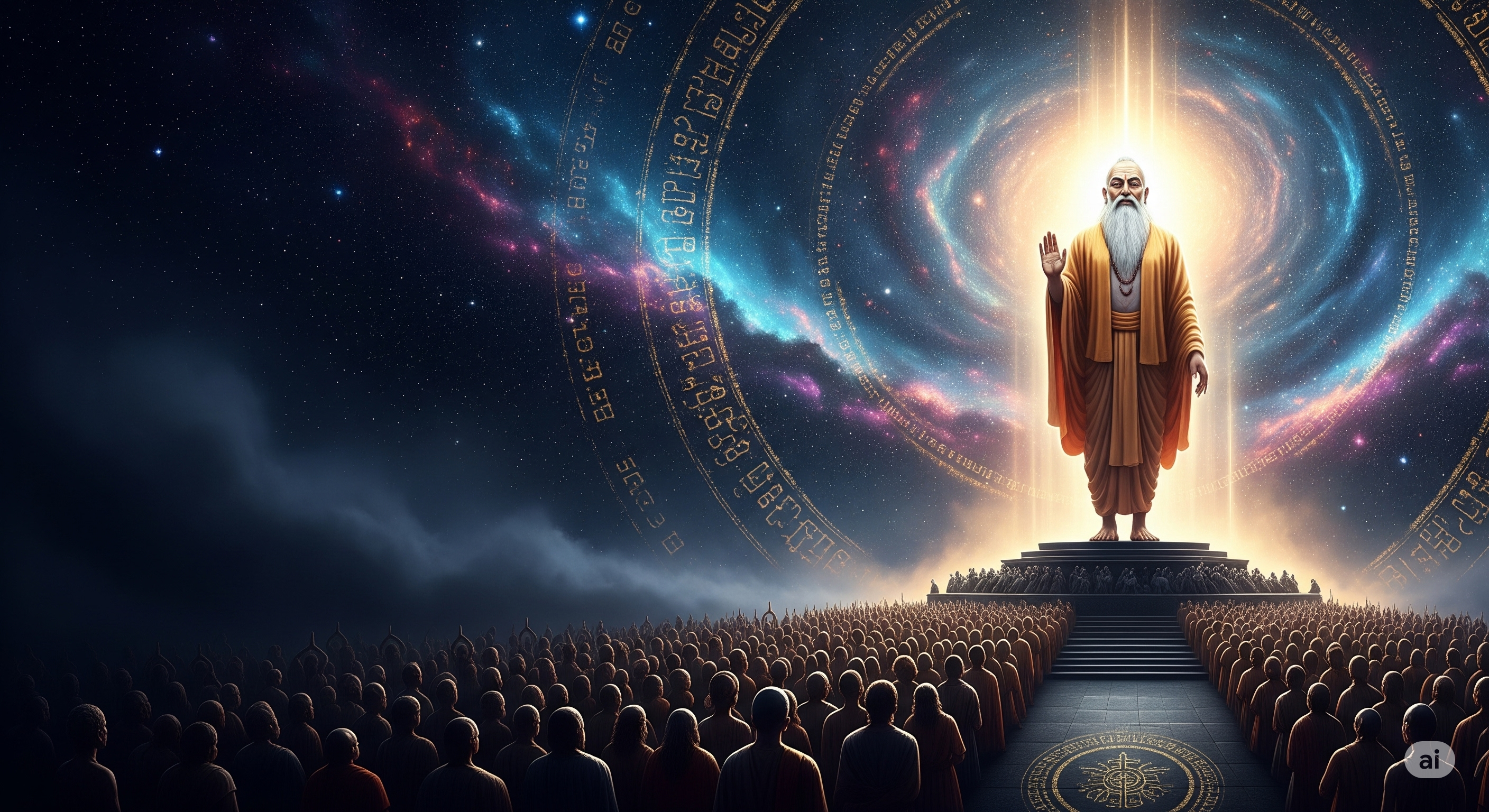Introduction
India, often described as the “Vishwaguru” or Teacher of the World, has a legacy that stretches over 5,000 years, encompassing profound achievements in philosophy, science, mathematics, literature, art, and spirituality. This ancient civilization not only shaped its own society but also influenced regions across Asia, the Middle East, and Europe.
The concept of Vishwaguru embodies the vision of India as a nation that imparts knowledge, ethical values, and cultural wisdom to the world. By examining India’s historical contributions, one can trace the foundations of modern sciences, governance, education, and arts, showcasing how ancient Indian knowledge systems continue to resonate globally.
1. Philosophical Contributions
1.1 Vedic Philosophy
- The Vedas, dating back to 1500–500 BCE, are among the earliest written records of human thought.
- They explore cosmology, ethics, meditation, and the relationship between humans and nature.
- Vedic texts also include mathematical and astronomical concepts, demonstrating early integration of science and philosophy.
1.2 Upanishadic Thought
- The Upanishads emphasize self-realization, consciousness, and the unity of existence (Brahman).
- They introduced ideas of karma, dharma, and moksha, influencing both Eastern and Western philosophical discourse.
- Indian philosophical concepts such as Advaita Vedanta inspired global thinkers in spirituality and metaphysics.
1.3 Buddhism and Jainism
- India is the birthplace of Buddhism and Jainism, two philosophies emphasizing non-violence, ethics, and rational thought.
- Buddhist principles of compassion, mindfulness, and the middle path spread across Asia, shaping societies in China, Japan, Tibet, and Southeast Asia.
- Jain philosophy contributed ideas of ahimsa (non-violence) and environmental consciousness, influencing leaders like Mahatma Gandhi in modern times.
1.4 Logic and Rational Thought
- Ancient Indian scholars such as Gautama (Nyaya philosophy) developed formal logical systems, predating similar structures in Europe.
- These systems included syllogisms, epistemology, and debate techniques, forming the basis of rigorous reasoning.
2. Scientific and Mathematical Contributions
2.1 Mathematics
- India’s mathematical advancements had a global impact, especially the development of the decimal system and zero.
- Aryabhata (476–550 CE) contributed trigonometry, algebra, and astronomical calculations.
- Brahmagupta (598–668 CE) formalized rules for zero, negative numbers, and quadratic equations, concepts fundamental to modern mathematics.
2.2 Astronomy
- Ancient Indian astronomers accurately described planetary motion, eclipses, and solar and lunar cycles.
- Texts like the Surya Siddhanta outlined sidereal calculations used even today in modern astronomy.
- Indian astronomers influenced Islamic scholars, and through translations, their work reached Europe during the Middle Ages.
2.3 Medicine (Ayurveda)
- Ayurveda, the traditional Indian system of medicine, emphasizes holistic health, herbal remedies, surgery, and preventive care.
- Sushruta Samhita and Charaka Samhita document early surgical techniques, anatomical knowledge, and medicinal practices.
- Concepts like detoxification, balance of bodily energies (doshas), and nutrition have gained global recognition in modern wellness and integrative medicine.
2.4 Metallurgy and Engineering
- Ancient India mastered metallurgy, producing high-quality iron, steel (e.g., Delhi Iron Pillar), and bronze sculptures.
- Engineering feats include urban planning in Mohenjo-Daro and Harappa, featuring grid layouts, drainage systems, and water management.
- These achievements highlight India’s ability to integrate scientific knowledge into practical applications.
3. Cultural Contributions
3.1 Literature and Language
- Ancient India produced epic texts such as the Mahabharata and Ramayana, which combine moral lessons, philosophy, and historical narratives.
- Sanskrit, the classical language, influenced grammar, linguistics, and literary traditions across Asia.
- Indian literary works contributed to drama, poetry, and philosophical discourse, impacting global literature and storytelling.
3.2 Arts and Architecture
- India’s temple architecture (e.g., Khajuraho, Konark) showcases mathematical precision, sculpture, and iconography.
- Rock-cut caves like Ajanta and Ellora demonstrate mastery in painting, carving, and religious symbolism.
- Indian classical dance forms (Bharatanatyam, Kathak) and music traditions influenced cultural expressions across Asia.
3.3 Trade and Cultural Exchange
- India’s strategic location enabled ancient trade with Mesopotamia, Egypt, and Southeast Asia, fostering cultural exchange.
- Indian knowledge in mathematics, medicine, textiles, and spices spread along trade routes.
- This exchange laid the foundation for India’s soft power and global cultural influence.
4. Educational Systems and Knowledge Transmission
4.1 Ancient Gurukuls and Universities
- Gurukuls were residential learning centers emphasizing holistic education, moral development, and intellectual training.
- Universities such as Nalanda, Takshashila, and Vikramshila attracted students from China, Tibet, Korea, and Central Asia.
- These institutions offered multidisciplinary studies, including philosophy, medicine, astronomy, mathematics, and military science.
4.2 Influence on Global Education
- Indian knowledge systems influenced Buddhist scholars traveling to East Asia, establishing educational traditions.
- Concepts like critical thinking, debate, and holistic learning predate modern liberal arts education.
- India’s ancient pedagogical models exemplify knowledge sharing, mentorship, and lifelong learning, principles central to the Vishwaguru vision.
5. Spiritual and Ethical Leadership
5.1 Yoga and Meditation
- Yoga, originating in India, emphasizes physical, mental, and spiritual well-being.
- Meditation techniques like Dhyana and practices such as Pranayama are recognized worldwide for stress reduction and mental clarity.
- International Yoga Day (21st June) reflects India’s global influence in promoting health and spirituality.
5.2 Ethical Principles
- Indian philosophies advocate non-violence (ahimsa), truth (satya), and self-discipline (tapas).
- Leaders like Mahatma Gandhi applied these principles globally in freedom movements and ethical governance.
- These teachings reinforce India’s potential role as Vishwaguru in moral and ethical leadership.
5.3 Interfaith Dialogue and Tolerance
- India’s pluralistic society nurtured coexistence of multiple religions and philosophies.
- Ancient teachings emphasize respect for diversity, dialogue, and mutual understanding, relevant to contemporary global peace efforts.
6. Lessons from Ancient Civilizations
6.1 Integration of Knowledge and Practice
- Indian civilization demonstrates synergy between theoretical knowledge and practical applications, e.g., astronomy applied to calendar systems.
- This integration fostered innovation, sustainability, and societal advancement.
6.2 Emphasis on Ethics and Morality
- Ancient Indian texts highlight the importance of ethical governance, social justice, and human values.
- Lessons from rulers like Ashoka illustrate the application of moral principles in administration.
6.3 Contribution to Global Knowledge
- Indian mathematics, astronomy, medicine, and philosophy formed the foundation for global scientific and cultural development.
- Trade and scholarly exchanges spread Indian wisdom to East Asia, the Middle East, and Europe, shaping civilizations.
6.4 Sustainability and Environmental Awareness
- Ancient texts emphasize living in harmony with nature, resource conservation, and ecological balance.
- Practices in agriculture, water management, and urban planning reflect sustainable development principles.
7. India’s Modern Role as Vishwaguru
7.1 Cultural Diplomacy
- India leverages its heritage, yoga, Ayurveda, and arts to influence global culture.
- Initiatives like International Yoga Day and cultural festivals showcase India’s soft power.
7.2 Scientific and Technological Leadership
- ISRO’s achievements in space research, IT innovations, and pharmaceutical contributions reflect India’s modern Vishwaguru potential.
- By combining ancient knowledge with modern technology, India demonstrates leadership in innovation, sustainability, and global problem-solving.
7.3 Ethical and Spiritual Leadership
- India continues to offer ethical frameworks, spiritual guidance, and philosophical insights relevant to global challenges.
- Principles of non-violence, tolerance, and inclusivity serve as models for international cooperation and peace.
7.4 Education and Knowledge Sharing
- Indian universities and research institutions promote global collaboration, research, and innovation.
- Scholarships, online courses, and international academic partnerships extend India’s educational influence worldwide.
Conclusion
India’s identity as a Vishwaguru is rooted in its ancient civilization’s achievements in philosophy, science, and culture. By examining the Vedas, Upanishads, Buddhist and Jain philosophies, mathematical discoveries, medical systems, arts, and educational institutions, one can appreciate India’s enduring global influence.
The lessons from India’s ancient civilizations are clear: knowledge must be integrated with ethics, innovation must serve humanity, and cultural wisdom should guide global development. In the modern world, India continues to embody the role of Vishwaguru through spiritual, cultural, scientific, and educational leadership.
By preserving its heritage, promoting education, and applying ethical principles, India remains poised to guide the world in sustainable development, moral governance, and human progress—a true Teacher of the World.




